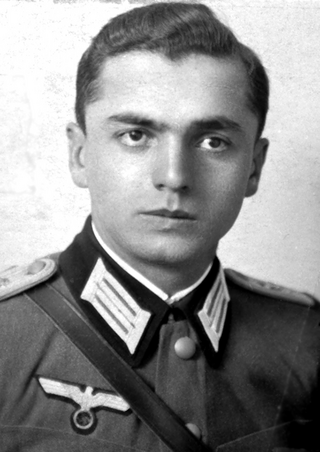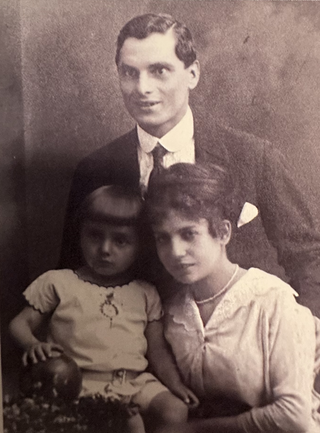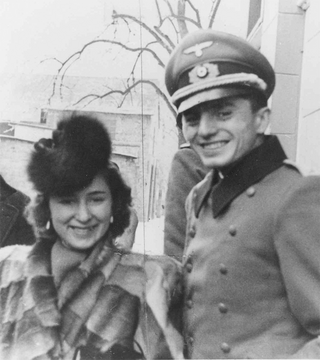Major Carl Otto Josef Szokoll (geb. Schöpfleuthner)

Personalia
Born:
Died:
Profession:
Persecution:
Resistance fighter
Honors:
Grand Decoration of Honor in Silver for Services to the Republic of Austria
Ring of Honor of the City of Vienna
Honorary Citizen of the City of Vienna
Iron Cross I. Class
Iron Cross II Class
War Merit Cross I Class with Swords
War Merit Cross II Class with Swords
Memberships
Curriculum Vitae
Carl Otto Josef Szokoll was born in Vienna as the illegitimate son of Karl Szokoll, a vice lieutenant in the Imperial High and German Master Regiment, and Maria Schöpfleuthner. After returning from Russian captivity in 1918, his parents married and Carl Szokoll took the surname Szokoll.
In 1936, Carl Szokoll met Christine Kukula, who was partly of Jewish descent, at a dance school in Vienna. A marriage before 1938 failed due to Carl Szokoll's insecure professional position and his father's resistance.
On March 12, 1938, the staunch Austrian had to witness the demise of free and independent Austria with the invasion of the German Wehrmacht. With the occupation of Austria, German legislation was adopted and with it the 'Nuremberg Race Laws', according to which Christine Kukula was classified as a 'Mischling I.
Carl Szokoll is accepted into the German Wehrmacht as a lieutenant and assigned to Kradschützen-Bataillon 2 of the 2nd Panzer Division. After the German invasion of Poland, Carl Szokoll was deployed there and later in France, where he was seriously injured and only classified as fit for garrison duty. He returned to Vienna in February 1941 and was promoted to captain. From 1943, he was an ordinance officer in the XVII Army Corps, responsible for material procurement.

The aim of 'Operation Valkyrie' was not only to assassinate Adolf Hitler, but also to take complete control of the National Socialist power apparatus, suppress any resistance from NSDAP supporters and subsequently conclude an armistice with the Allies.
[...]
But beyond this right, is there not only a right, but even a duty to resist? Yes.
[...]
Perhaps not as a written, state-supporting law, but as a maxim for the actions of every single one of its citizens - because this duty to resist the ruler who commands injustice alone ensures the continued existence of our democracy.
[...]
After the tragic collapse of 'Operation Valkyrie', Carl Szokoll managed to remain undetected in Vienna as he had received the 'Valkyrie orders' via an untraceable internal telephone line. Not only did he remain completely undetected, but to his own astonishment he was even promoted to major on August 1, 1944 and appointed head of a branch office of the Army High Command for the south-east.
Carl Szokoll was not discouraged by this setback and soon afterwards made contact with the resistance group 'O5'. As the Red Army drew ever closer to Vienna in March 1945, he was commissioned to draw up a plan for the defense of Vienna. If Vienna could not be held, he was to determine which central infrastructure was to be destroyed as a 'Nero order'. He planned to facilitate the Red Army's access via the west by positioning the four SS divisions assigned to the defense of Vienna in the east and south. In addition, the military resistance was to open a gap in the defensive ring in order to shorten the battle for Vienna. This plan was given the name 'Operation Radetzky'.
However, the 'Operation Radetzky' planned for 6 April 1945 was betrayed. The liberation fighters Lieutenant Rudolf Raschke, Captain Alfred Huth and Major Karl Biedermann were hanged by the SS at Floridsdorfer Spitz on April 8, 1945. A plaque with the inscription: "I made a pact with the Bolshevists!" was placed on the chests of Rudolf Raschke and Karl Biedermann.

An arrest warrant is also issued for Carl Szokoll. However, he was warned by Sergeant Major Ferdinand Käs and was able to escape arrest in time. Although an attempt to defect to the Soviets near Hütteldorf fails, he is able to hide in the apartment of a Communist woman. After the liberation of the western districts of Vienna, he immediately reports to the staff of the Soviet troops.
Shortly after the liberation of Vienna by the Red Army, he finds himself in the crosshairs of the Soviets. Together with other members of the 'O5', he was arrested on April 15, 1945. Although he managed to escape on June 2, 1945, he was arrested again on September 5, 1945. After he was able to convince the Russian officers that he was not an American spy, he was finally released on October 17, 1945.
After the war, Carl Szokoll married his long-time girlfriend Christine Kukula in 1946, with whom he would remain together for the rest of his life. They have a son together. After a less successful job as an editor for a children's book publisher, he came into contact with the film business. He rises to the position of production manager and is involved in the films 'The Last Bridge' and 'The Last Act'. He later founded the production company 'Neue Delta' and, together with director Franz Antel, who is a member of the ÖVP-Kameradschaft der politisch Verfolgten und Bekenner für Österreich, produced the film series 'Der Bockerer'. He finally retires in Vienna. Carl Szokoll dies in Vienna at the age of 88 and is laid to rest at Vienna's Central Cemetery.
Places
Residence:
Honoring:
Citations
Wiener Stadt- und Landesarchiv (WStLA)
Bundesministerium für Arbeit und Wirtschaft (2024): Carl Szokoll. Österreichischer Widerstand gegen das NS-Regime im Regierungsgebäude (Wien)
Geschichte.Wien.Wiki unter www.geschichtewiki.wien.gv.at/Carl_Szokoll
Wikipedia unter de.wikipedia.org/wiki/Carl_Szokoll
